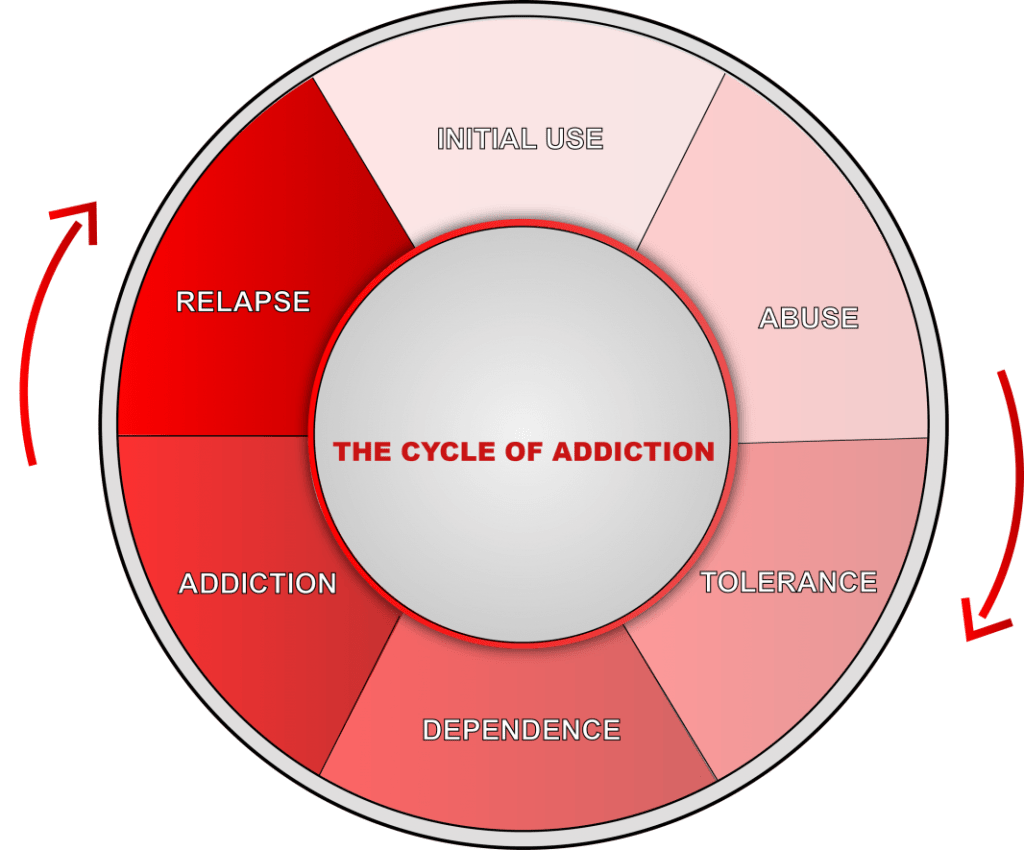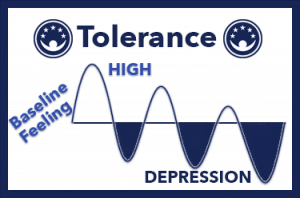Understanding the cycle of addiction can help you decide if you or a loved one needs treatment.
The Cycle of Addiction
How does addiction start?
Most people who consume alcohol don’t have a couple drinks at a social event and then wake up an alcoholic the next day. Often, several circumstances have to line up that cause an individual to become addicted to drugs or alcohol. The multiple stages of addiction can occur over a short period of time, or take months or years to develop. The basic cycle an addicted individual goes through is as follows:

- Initial Use The cycle of addiction starts the user first comes into contact with a substance. There are many reasons why an individual might try the substance at the beginning; it could be prescription medication to manage pain, a social event where alcohol is present, or simply peer-pressure to use the substance to fit in with friends.
- Abuse The next stage of the addiction cycle is when an individual starts using a substance on a recurring improper basis. This could mean an individual starts to increase their alcohol consumption as a response to anxiety or stress, or they begin taking higher doses of pain medication without consulting their doctor. It can sometimes be hard to tell exactly when abuse starts to occur, but it can often be defined as the point when a substance is being used for a euphoric response or high instead of for the social aspect or its intended use.
- Tolerance
 When an individual abuses a substance over a long period of time, they begin to enter the next stage in the addiction cycle: Tolerance. In this stage, chemical changes in the brain start to occur. Some of these chemical changes cause the original dosage of a substance to no longer produce the same physical or mental effects the user has gotten used to. As a result, the user may increase the dosage or frequency of use of a substance to try to recapture the original euphoria or high. This may work for a while, but over time tolerance to the new increased dosage will inevitably occur. When this happens, the individual will increase the dosage again, which slowly creates a progression into heavy substance abuse.
When an individual abuses a substance over a long period of time, they begin to enter the next stage in the addiction cycle: Tolerance. In this stage, chemical changes in the brain start to occur. Some of these chemical changes cause the original dosage of a substance to no longer produce the same physical or mental effects the user has gotten used to. As a result, the user may increase the dosage or frequency of use of a substance to try to recapture the original euphoria or high. This may work for a while, but over time tolerance to the new increased dosage will inevitably occur. When this happens, the individual will increase the dosage again, which slowly creates a progression into heavy substance abuse. - Dependence At a certain point, the body or brain becomes dependent on the having the substance to function properly, or for the user to feel “normal”.
- Addiction After long time use, an individual will finally reach the addiction stage. Addiction is defined by psychiatry.org as a complex chronic mental health disorder that is the result of compulsive substance use despite harmful consequences. An individual who has reached this stage will have an intense focus on using a certain substance to the point that it completely takes over their life. This means that an individual’s relationships, job, finances, overall mental and physical health and more can all be negatively impacted from their substance abuse.
- Relapse Eventually an addicted individual can come to realize the harmful or dangerous consequences of their substance abuse or grow tired of their life revolving around their addiction. This leads to an attempt to stop using. But sometimes withdrawal symptoms, certain triggers, or other factors in the individual’s life may cause them to relapse. A relapse is defined as a downward spiral back into the compulsive behavior of addiction.
- Destructive thoughts
- Mood swings including the recurrence of depression or anxiety
- Isolation from groups and activities
- Compulsive behavior
- Return to unhealthy behaviors and environments
Source: https://americanaddictioncenters.org/the-addiction-cycle/
“I would like to offer my sincerest thank you to the New Vision staff and the nurses during my stay. I was treated with nothing less than gentle and great respect as a patient.”
– Missouri

